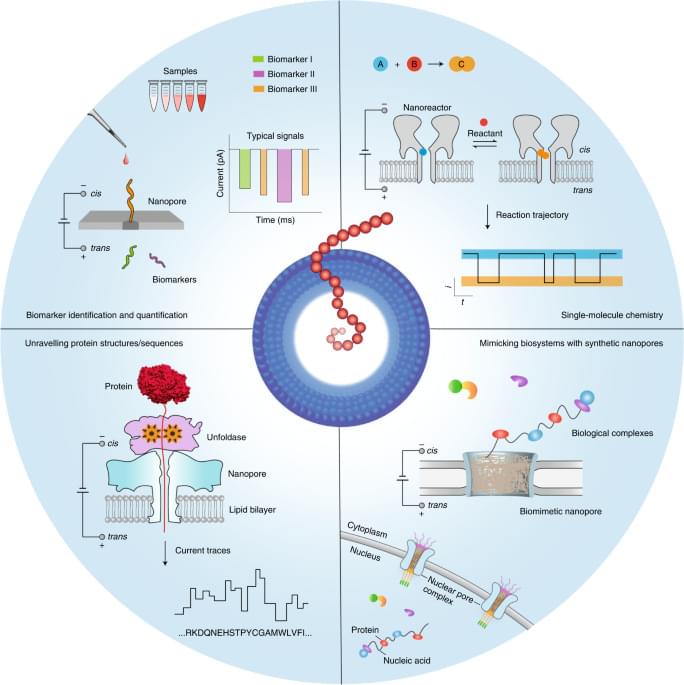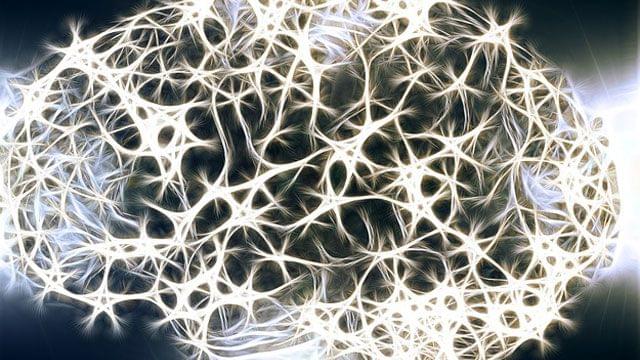One of the best transhumaism movies was 2001 the space odyssey and one of the stories is the last question by isaac asimov.
Gary Numan — Films extended.
- no copyright intended.
- all rights to original owners.
One of the best transhumaism movies was 2001 the space odyssey and one of the stories is the last question by isaac asimov.
Gary Numan — Films extended.
- no copyright intended.
- all rights to original owners.

Ideally, the nanopore dimensions should be comparable to those of the analyte for the presence of the analyte to produce a measurable change in the ionic current amplitude above the noise level. Nanopores can be formed in several ways, with a wide range of pore diameters. Biological nanopores are formed by the self-assembly of either protein subunits, peptides or even DNA scaffolds in lipid bilayers or block copolymer membranes1,3,6,17,18. They possess atomically precise dimensions controlled by biopolymer sequences, providing the ability to recognize biomolecules with constriction diameters of ~1–10 nm. Solid-state nanopores are crafted in thin inorganic or plastic membranes (for example, SiNx), which allows the nanopores to have extended diameters of up to hundreds of nanometres, permitting the entry or analysis of large biomolecules and complexes. The tools for fabricating solid-state nanopores, which include electron/ion milling4,5, laser-based optical etching19,20 and the dielectric breakdown of ultrathin solid membranes21,22, can be used to manipulate nanopore size at the nanometre scale, but allow only limited control over the surface structure at the atomic level in contrast to biological nanopores. The chemical modification and genetic engineering of biological nanopores, or the introduction of biomolecules to functionalize solid-state nanopores23, can further enhance the interactions between a nanopore and analytes, improving the overall sensitivity and selectivity of the device2,17,24,25,26. This feature allows nanopores to controllably capture, identify and transport a wide variety of molecules and ions from bulk solution.
Nanopore technology was initially developed for the practicable stochastic sensing of ions and small molecules2,27,28. Subsequently, many developmental efforts were focused on DNA sequencing1,7,8,9. Now, however, nanopore applications extend well beyond sequencing, as the methodology has been adapted to analyse molecular heterogeneities and stochastic processes in many different biochemical systems (Fig. 1). First, a key advantage of nanopores lies in their ability to successively capture many single molecules one after the other at a relatively high rate, which allows nanopores to explore large populations of molecules at the single-molecule level in reasonable timeframes. Second, nanopores essentially convert the structural and chemical properties of the analytes into a measurable ionic current signal, even achieving enantiomer discrimination29. The technology can be used to report on multiple molecular features while circumventing the need for labelling chemistries, which may complicate the overall analysis process and affect the molecular structures. For example, nanopores can discriminate nearly 13 different amino acids in a label-free manner, including some with minute structural differences30. An important aspect is the ability of nanopores to identify species31 that lack suitable labels for signal amplification or whose information is hidden in the noise of analytical devices. Consequently, nanopores may serve well in molecular diagnostic applications required for precision medicine, which achieves the identification of nucleic acid, protein or metabolite analytes and other biomarkers11,32,33,34,35. Third, nanopores provide a well-defined scaffold for controllably designing and constructing biomimetic systems, which involve a complex network of biomolecular interactions. These nanopore systems track the binding dynamics of transported biomolecules as they interact with nanopore surfaces, hence serving as a platform for unravelling complex biological processes (for example, the transport properties of nuclear pore complexes)36,37,38,39. Fourth, chemical groups can be spatially aligned within a protein nanopore, providing a confined chemical environment for site-selective or regioselective covalent chemistry. This strategy has been used to engineer protein nanoreactors to monitor bond-breaking and bond-making events40,41.
Here we discuss the latest advances in nanopore technologies beyond DNA sequencing and the future trajectory of the field, as well as the opportunities and main challenges for the next decade. We specifically address the emerging nanopore methods for protein analysis and protein sequencing, single-molecule covalent chemistry, single-molecule analysis of clinical samples and insights into the use of biomimetic pores for analysing complex biological processes.

Summary: Most AI models are unable to represent features of human vision, making them worse at recognizing images.
Source: HSE
Researchers from HSE University and Moscow Polytechnic University have discovered that AI models are unable to represent features of human vision due to a lack of tight coupling with the respective physiology, so they are worse at recognizing images.

Using artificial intelligence, physicists have compressed a daunting quantum problem that until now required 100,000 equations into a bite-size task of as few as four equations—all without sacrificing accuracy. The work, published in the September 23 issue of Physical Review Letters, could revolutionize how scientists investigate systems containing many interacting electrons. Moreover, if scalable to other problems, the approach could potentially aid in the design of materials with sought-after properties such as superconductivity or utility for clean energy generation.
“We start with this huge object of all these coupled-together differential equations; then we’re using machine learning to turn it into something so small you can count it on your fingers,” says study lead author Domenico Di Sante, a visiting research fellow at the Flatiron Institute’s Center for Computational Quantum Physics (CCQ) in New York City and an assistant professor at the University of Bologna in Italy.
The formidable problem concerns how electrons behave as they move on a gridlike lattice. When two electrons occupy the same lattice site, they interact. This setup, known as the Hubbard model, is an idealization of several important classes of materials and enables scientists to learn how electron behavior gives rise to sought-after phases of matter, such as superconductivity, in which electrons flow through a material without resistance. The model also serves as a testing ground for new methods before they’re unleashed on more complex quantum systems.
Saildrone/NOAA
Recently, the collaboration between the U.S. National Oceanic and Atmospheric Administration (NOAA) and Saildrone, a company that develops sailing drones, did exactly that. They sent a robot into Hurricane Fiona, the tropical storm that has deluged Puerto Rico and is now headed towards Canada’s east coast, Mashable reported.

Associate Professor Miriam Klein-Flügge and colleagues looked at brain connectivity and mental health data from nearly 500 people. In particular, they looked at the connectivity of the amygdala – a brain region well known for its importance in emotion and reward processing. The researchers used functional magnetic resonance imaging to consider seven small subdivisions of the amygdala and their associated networks rather than combining the whole region together as previous studies have done.
The team also adopted a more precise approach to the data on mental wellbeing, looking at a large group of healthy people and using questionnaires that captured information about wellbeing in the social, emotional, sleep, and anger domains. This generated more precise data than many investigations which still use broad diagnoses such as depression or anxiety, which involve many different symptoms.
The paper, published in Nature Human Behaviour, shows how the improved level of detail about both brain connectivity and wellbeing made it possible to characterise the exact brain networks that relate to these distinct aspects of mental health. The brain connections that mattered most for discerning whether an individual was struggling with sleep problems, for example, looked very different from those that carried information about their social wellbeing.


Disperse, a U.K.-based construction tech company that offers an artificial intelligence (AI)-powered platform to help project managers track work and capture data from building sites, has raised $16 million in funding.
Founded out of London in 2015, Disperse effectively creates a digital version of an entire construction site, including visual snapshots that track the progress of work to help all stakeholders — regardless of where they’re based — keep up with things. For this, Disperse sends someone around a site at regular intervals with a standard 360° camera, and the resulting imagery is fed directly into the Disperse platform which processes the visuals and applies computer vision techniques to figure out what’s happening.
For example, this can help to show the state of a project at a given moment in time, and solve disputes should they arise in terms of determining whether a job was completed as it should’ve been. It also automatically spotlights potential problems or bottlenecks while they can still be resolved.


Massachusetts Institute of Technology (MIT) engineers have developed a battery-free, wireless underwater camera that’s powered by sound waves.
Scientists estimate that more than 95 percent of Earth’s oceans have never been observed, which means we have seen less of our planet’s ocean than we have the far side of the moon or the surface of Mars.
The high cost of powering an underwater camera for a long time, by tethering it to a research vessel or sending a ship to recharge its batteries, is a steep challenge preventing widespread undersea exploration.
MIT researchers have taken a major step to overcome this problem by developing a battery-free, wireless underwater camera that is about 100,000 times more energy-efficient than other undersea cameras. The device takes color photos, even in dark underwater environments, and transmits image data wirelessly through the water.